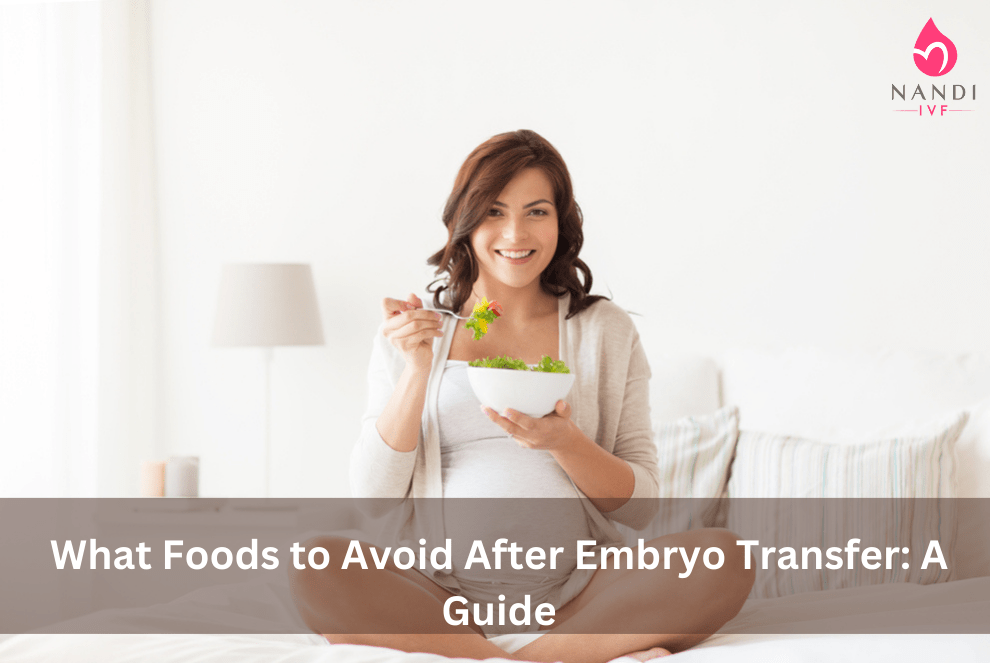

Embarking on the journey to parenthood is a very special and personal feeling for any couple. It requires proper planning, both financial and health-wise as well. And taking proper measures becomes paramount when undergoing IVF treatment for conception. The journey of IVF is a delicate period. Several rules are to be followed, especially regarding food choices you make post-embryo transfer. Let’s begin your healthy journey with tips for what foods to avoid after embryo transfer.
Foods to avoid after embryo transfer: You should avoid foods with high-fat levels because they cause more inflammation, and the chances of getting pregnant can decrease. It is also not good for reproductive health as it can harm your baby. High-fat food items can cause diseases like diabetes and metabolic syndrome.
Avoid junk foods like fried food, chips, processed meats, and bakery products. This unhealthy diet can be harmful to your IVF procedure. Instead of eating these food items, you can eat healthy foods like fruits, green vegetables, juice, and food with more protein. These foods will strengthen your immune system and increase your embryo’s development. Follow this healthy diet to ensure a healthy baby and a healthy time during your pregnancy.
Avoiding drinks that include caffeine is a must during the IVF procedure because it can disrupt the procedure of attaching the embryo to the womb. The same goes for alcohol. Avoid it for a successful IVF procedure. More caffeine in coffee or any other drinks can increase the chances of miscarriage, and it can become a problem in your pregnancy period after IVF.
Moreover, if you avoid drinking alcohol and drinks with caffeine, it will be a plus point in your pregnancy as it will increase your fertility rate.
Make these changes to your diet for a healthy pregnancy:
Remember, you must check the label while drinking any beverage. Always check the quality of caffeine in the drinks. This will make sure that you are not consuming more caffeine.
Read Also: Empowering Couples For Parenthood: Navigating Pregnancy With PCOS And PCOD
Foods to avoid after embryo transfer: It is advisable to avoid processed meals following an IVF operation. These foods can be harmful during this time because they include high sugar and fat, which may cause more inflammation and disrupt your reproductive health.
Excess processed foods can increase the risk of diabetes and high blood pressure. These diseases harm the embryo’s development, and it will not be safe for your pregnancy. During the post-IVF, focus on eating nutritious foods rather than processed meals. Eat more healthy foods like fruits, green vegetables, and whole grains. These meals are full of nutrients that provide your body with important nutrients. This will keep inflammation levels low, critical for a healthy pregnancy.
Additionally, avoid foods that contain high amounts of sugar. Packaged foods contain harmful preservatives and hydrogenated oils, which are bad for pregnant women. This also undermines the embryo’s health as the mother’s dietary intake forms the basis for the nutrition of the embryo via the placenta. So, remember the foods to avoid after embryo transfer during pregnancy.
Read Also: Positive Signs After Embryo Transfer
Along with the foods to avoid after embryo transfer, there are some things you should never forget during your pregnancy. They are listed below:
Sticking to regular meal times and not skipping them after an IVF procedure is important. If you skip your meal, it will become difficult for the embryo to attach to your womb. Skipping meals means you will not get enough nutrition, which can lead to lower sugar levels. You will feel tired if you do not get your meal right now. Eat healthy foods on time; this nutritious food ensures the embryo can attach to your womb properly.
Avoid overeating or indulging in too many unhealthy snacks, as this can upset the hormonal balance necessary for fertility. Pay attention to your food choices and portion sizes to optimise your chances of a successful pregnancy without AI-generated content detection.
Read Also: 7 Days After Embryo Transfer Symptoms
Apart from the general advice of avoiding processed foods and eating regular meals after an IVF procedure, there might be some special dietary rules depending on your unique situation or what your clinic recommends.
For example, some clinics may ask you to be more physically active before the embryo transfer and suggest a diet rich in protein and vitamins. You should cut back on things like red meat or processed snacks. It is advised to always ask your doctor before eating any other food that your doctor has not recommended.
Along with these dietary and lifestyle choices, keeping your mind and body completely stress-free is important. The process of IVF can often be taxing for a couple; hence, it is important that they practise relaxation techniques together. Meditation is one such technique that helps the mother feel relaxed and at ease during her pregnancy. A calm mind will ensure the hormones are produced and distributed correctly.
Additionally, a calm mind will help the couple trust the process and remain positive throughout their procedures.
Parenthood is one of the most beautiful phases in a couple’s life. It involves various steps, from changing to a healthier lifestyle to practising mental calmness. At Nandi IVF, we will partner in this journey and assist you with a team of highly skilled doctors. We will clear all your doubts and be at every step of the way, including your daily diet. Contact the best IVF centre to ensure your pregnancy journey is smooth. Make your dreams of parenthood come true.
Read Also: Understanding the Signs of Bad Egg Quality – Taking the Right Steps
Read Also: After How Many Weeks IVF Pregnancy Is Safe
Read Also: After Embryo Transfer Day by Day Symptoms
Read Also: Apricots in Pregnancy: Unveiling the Nutritional Bonanza for Expectant Mothers
1
2
3
4
5
6